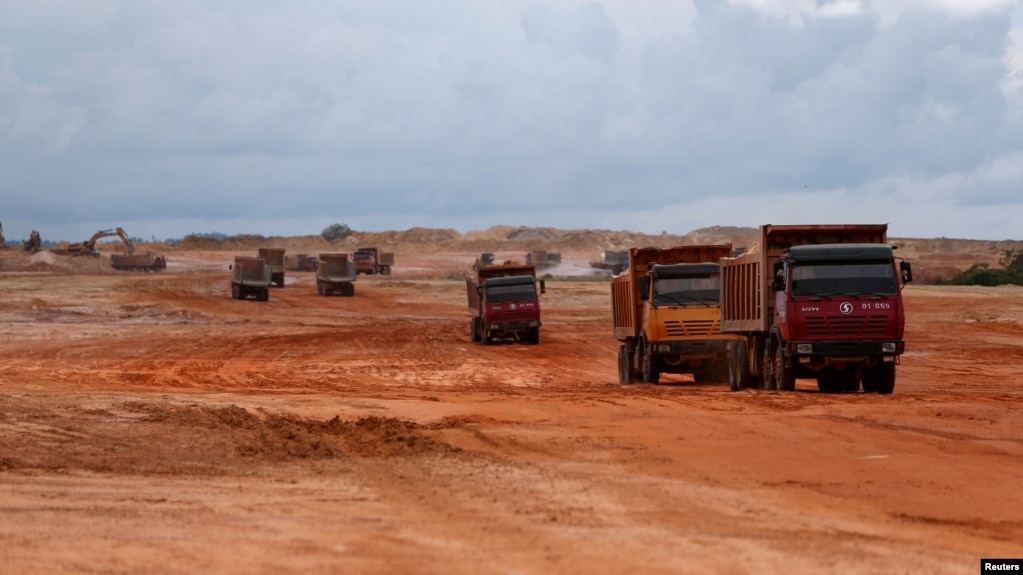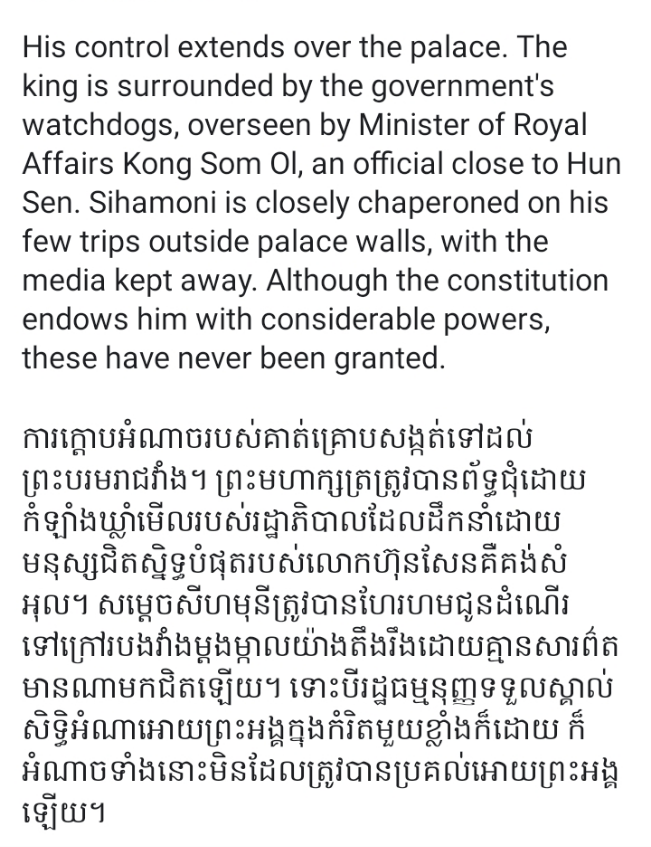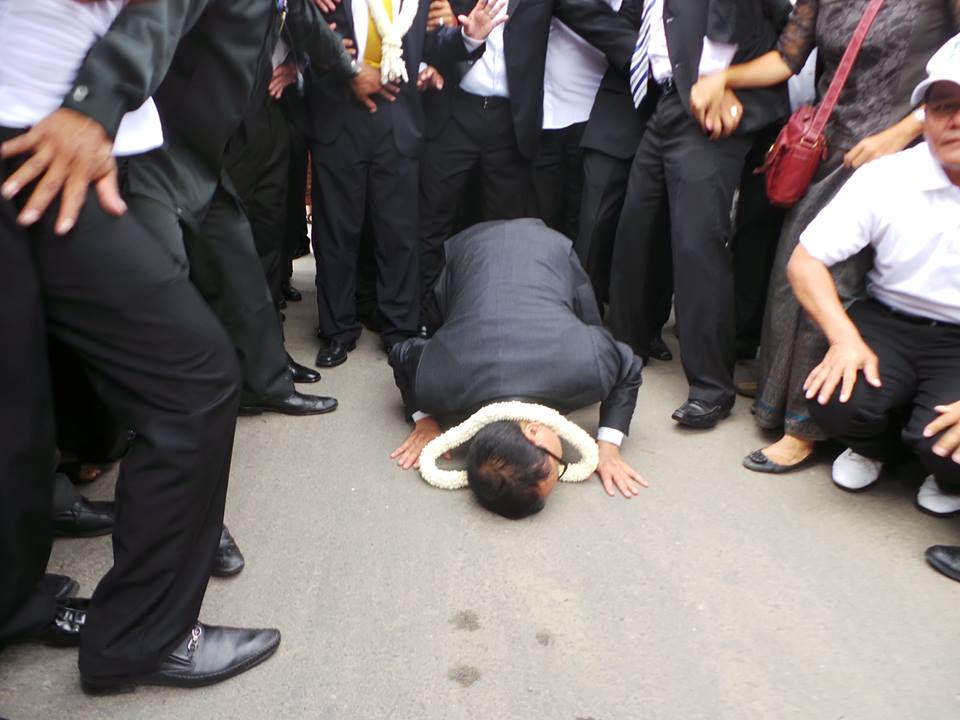This is not a paper “war game.” America’s military has already considered this hypothetical, and has bombed its enemies on Cambodian soil once before. This time the objective would be to remove China’s military from Southeast Asia, and more broadly the Indo-Pacific, which includes the South China Sea. A collateral effect of bombing Cambodia could be changes in power which non-violent measures, like sanctions, could not effect. America would “kill two birds with one stone.”
នេះមិនមែនជាសំណេរហ្គេមសង្រ្គាមទេ។ ទ័ពអាមេរិកធ្លាប់ពិចារណាលើការសន្និដ្ឋាននេះ ហើយបានទំលាក់គ្រាប់បែកទៅលើសត្រូវរបស់ខ្លួននៅលើទឹកដីកម្ពុជាម្តងពីមុន។ ពេលនេះ គោលបំណងគឺដើម្បីរំលាយទ័ពចិនចេញពីតំបន់អាស៊ីអាគ្នេយ៌ ដែលរួមបច្ចូលទាំងមហាសមុទ្រចិនខាងត្បូង។ ផលពីទង្វើនៃការទំលាក់គ្រាប់បែកលើទឹកដីកម្ពុជាអាចធ្វើអោយមានការផ្លាស់ប្តូរប៉ូលអំណាច នៅពេលដែលវិធានការអហឹង្សានានាដូចជាការដាក់ទណ្ឌកម្មគ្មានប្រសិទ្ធិភាព។ អាមេរិកនឹងសំឡាប់បានសត្វពីរព្រួញមួយពេលនេះ។
A new ‘Trump Doctrine’ could start with Cambodia

Op-Ed: Asia Time, By CHRISTOPHER BERES
Picture this: Somewhere in the South China Sea, which China claims as its own, a Chinese warship confronts a Philippine warship or, maybe it’s vice versa, and shots are exchanged. It doesn’t matter which warship fired first. The fight is on and the Philippines’ warship is soon joined by American warships that come to the aid of their treaty ally. China marshals its resources, calling more of its warships to join the fight.
China’s military, which has clandestine facilities in Cambodia, ostensibly for the “repair and maintenance of its warships and jet fighters,” is ready to perform its support functions. The Chinese have prepared for this eventuality, but so too have the Americans. Rather than bomb mainland China, which could escalate the territorial dispute into a world war, America bombs China’s military facilities in Cambodia and, while at the task, bombs Cambodia’s military facilities as well. After all, Cambodia is not merely China’s friend, it’s China’s military ally.
This is not a paper “war game.” America’s military has already considered this hypothetical, and has bombed its enemies on Cambodian soil once before. This time the objective would be to remove China’s military from Southeast Asia, and more broadly the Indo-Pacific, which includes the South China Sea. A collateral effect of bombing Cambodia could be changes in power which non-violent measures, like sanctions, could not effect. America would “kill two birds with one stone.”
Reality is also fraught with peril. The US is engaged in a cold war with China. China is militarizing the South China Sea. Cambodia supports China’s claims to the South China Sea. The US believes Cambodia will permit China to position troops on its territory. China provides Cambodia with nearly all of its military assistance and small arms. Cambodia has had little choice but to engage China because of the historical threat and domestically unpopular land grabs from Vietnam to its east. The Philippines’ admiralty would also like to drag the US into a fight with China. America views China as a threat to the post-World War II status quo in Asia in which the US has heretofore been pre-eminent.
And while the Cambodian government has many US-educated leaders who could be pro-US, America has not played this card to improve its relationship with Cambodia, apparently having embarked on a course of non-violent measures to punish Cambodia.
Cambodia has been unfairly subject to a punitive US foreign policy for a long time. However, America’s policy could become more interventionist in order to counter China’s possible militarization of Cambodia
Cambodia has been unfairly subject to a punitive US foreign policy for a long time. However, America’s policy could become more interventionist in order to counter China’s possible militarization of Cambodia.
The US should engage with Cambodia as an ally, do business with it, and try to influence its actions with respect to China. The carrot is better than a stick that has not worked.
The US Congress’ current policy seeks to sanction Cambodia’s leaders, to deny Cambodia access to loans from international financial institutions, to withdraw Cambodia’s trade preferences, and to elevate a defunct opposition party to the status of the legitimate government of Cambodia. President Donald Trump has appointed a new ambassador to Cambodia whose self-professed mission is to promote democracy and human rights and work with Congress to punish Cambodia. In this context, America is in effect not willing to work with the long-standing de jure government in Phnom Penh.
Unfortunately, the United States’ experience with China over the last 30 years since Deng Xiaoping’s gaige kaifang (the “Four Modernizations”) has been that over time with economic development China has not become more open but more closed and militaristic. Cambodia is open and democratic and needs friendship from a democratic partner in the West.
America’s real objective in Cambodia is not a secret and has nothing to do with freeing Kem Sokha or reviving the Cambodia National Rescue Party; rather, it is to contain China to protect America’s legitimate national-security interests. Certainly, Cambodia also has its own national-security interests to protect vis-a-vis China.
It is in both America’s and Cambodia’s best interest to negotiate a deal to contain China.
As a gesture of goodwill, the US might consider forgiving Cambodia’s war debt, which totals around US$500 million, in the amount of $50 million for every year over the next 10 years. The cost to America’s national security should China gain a military foothold in Cambodia would be much greater than $500 million.
As for Cambodia, it must know that the US is a better strategic ally than China, one that does not have the same “hidden agenda.”
A new “Trump Doctrine” for Cambodia and other parts of Southeast Asia would enable the US president to apply “the art of the deal” to disrupting the current unsuccessful US policy in the region. The Trump Doctrine would extend the Monroe Doctrine to be “the doctrine of the world” and “upset the applecart” of the failed policies of the past. As with his bipartisan consensus trade policy toward China, the goal would be to end China’s aggression in the region permanently.Asia Times is not responsible for the opinions, facts or any media content presented by contributors. In case of abuse, click here to report.

Christopher Beres is a lawyer who has represented Cambodia in international litigation. He holds a master’s degree in East Asian Studies from the University of Pennsylvania.
=============
nullការសាងសង់អាកាសយាន្ដដ្ឋានអន្តរជាតិមួយដោយក្រុមហ៊ុនចិនក្នុងតំបន់តារាសាគរបង្កើតឱ្យមានការព្រួយបារម្ភ

គោលបំណងរបស់ក្រុមហ៊ុននេះ គឺសាងសង់ទីក្រុងដ៏ធំថ្មីមួយរបស់កម្ពុជានៅទីនេះ ដោយមានទីក្រុងលំហែកាយជាប់ឆ្នេរសមុទ្រ សណ្ឋាគារប្រណិតៗ និងផ្ទះវីឡា សួនឧស្សាហ៍កម្ម ស្ថានីយថាមពល រោងចក្រចម្រាញ់ទឹកស្អាត និងអាគារសុខាភិបាលជាដើម។ខេត្តកោះកុង —
Continue reading


